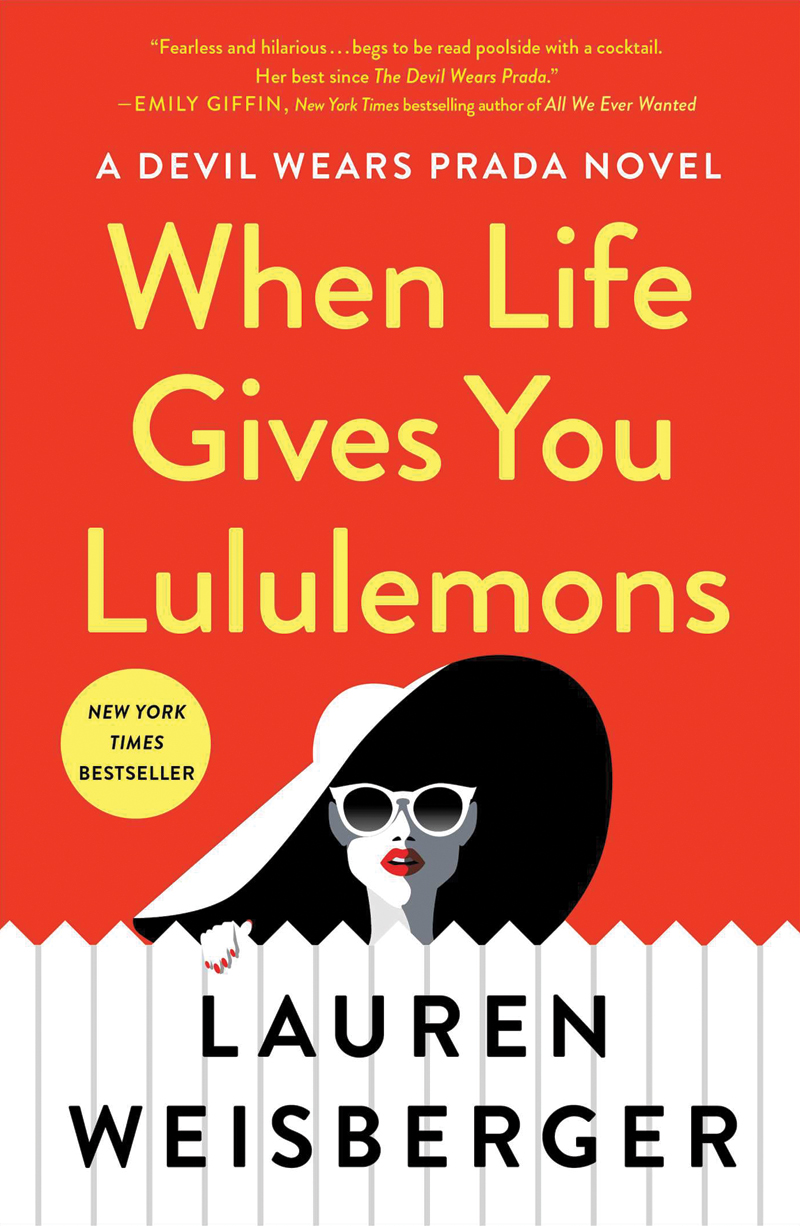“Chick lit” is often unfairly maligned as feminine, lowbrow escapism, the literary equivalent of an episode of The Real Housewives. This overlooks its mild charms and (I daresay) occasional sociological insights.
Luckily, Lauren Weisberger is happy to embrace the chick-lit market. Her new book, When Life Gives You Lululemons, is the perfect length and tone for a day of leisure reading (or, in my case, a day spent stuck on a delayed train).
The story focuses on Emily Charlton, the caustic, ambitious assistant to Miranda Priestly featured in Weisberger’s 2003 bestseller, The Devil Wears Prada (respectively played in the screen adaptation by Emily Blunt and Meryl Streep). Some time has passed since Emily was at Miranda’s beck and call at Runway magazine. She’s now married, pushing 40, and a successful Los Angeles-based celebrity image consultant who fears she is losing her edge and her clients to a younger rival.
After a disastrous New Year’s Eve, which takes her from a pornographic pool party in L.A. to the New York apartment of a Justin Bieber-like singer with impulse-control issues, she lands in the tony suburbs of Greenwich, Conn., at the home of her friend Miriam, a former attorney turned stay-at-home mom to three kids. Miriam enlists Emily to help Karolina, a famous former Victoria’s Secret model who is married to a U.S. senator with presidential aspirations. Karolina has just been spectacularly and publicly dumped by the senator after being wrongly arrested and accused of driving under the influence with her stepson and other children in the car.
That’s the narrative setup (and as the story progresses, it becomes clear that the DUI was in fact a setup) but managing Karolina’s crisis is really just an excuse for Weisberger to unleash Emily on an unsuspecting suburban population. Like a Manolo-shod Margaret Mead, Emily stalks the local haunts and observes the ladies of Greenwich’s 1 percent with anthropological rigor and a satirist’s eye. She realizes immediately that their perfectly manicured homes and bodies mask deep insecurities, and the reader is soon exhausted by the sheer number and detailed descriptions of the alterations undertaken by these women to keep their husbands happy and their self-worth at optimal levels. The phrase “bespoke vagina” appears more than once, and a great deal of Xanax and late-afternoon cocktail consumption occurs throughout.
These are evidently the medications needed to cope with the socioeconomic one-upmanship of the elite. The Lululemon of the book’s title refers to the expensive athleisure brand favored by the ladies of Greenwich, who spend a lot of their time working out and obsessing over their weight. This isn’t a Dove “Real Beauty” ad: A celebrity is described as “getting older and fatter by the second”; another character is horrified by “the sensation of her stomach fat rolling over the waistband” of her extra-compression yoga pants; a pregnant woman “looked like she’d swallowed a whole goat.” And if you don’t care what a Chopard purse or Diptyque candle is, you will likely find the endless status-signaling of brand-name clothing and accessories tedious.

The main characters’ insecurities, however, are humanizing. Miriam frets constantly about the 20 pounds she’s gained since having children and wonders if her husband is cheating on her; Emily worries that her sex appeal is fading, but after impetuously sexting a Greenwich man she met at a party, she feels confused and rejected, not empowered; and Karolina still nurses disappointment about her inability to conceive a child. The conceit that Emily is the world’s greatest crisis manager doesn’t always hold up, of course: At one point she asks Karolina, “Do you want your hair to say ‘drunk seductress’ or ‘dependable mom’? Because right now it’s screaming the former.”
But such quibbles don’t detract from an entertaining story that contains some unsparing, accurate, and poignant observations about the realities of being an almost-middle-aged woman in the 21st century. Readers don’t need to have the lavish homes or plastic-surgery budgets of the characters to relate to their anxieties about aging and the challenges of marriage and raising small children. Nonfiction writers like Pamela Druckerman have been exploring similar themes in recent books such as There Are No Grown-Ups.
There is also something satisfying about the twist Weisberger offers on the classic tale of the male midlife crisis. In the traditional story, women are the victims of men; in Weisberger’s book, they are triumphant (albeit often quite tipsy) and ultimately sympathetic. It’s a lively, funny, and at times uncomfortably honest portrait of middle age and female friendship, even if the elitist Greenwich wonderland of pressed-juice bars and shopping and SoulCycle classes is not at all the way most of us live now.
